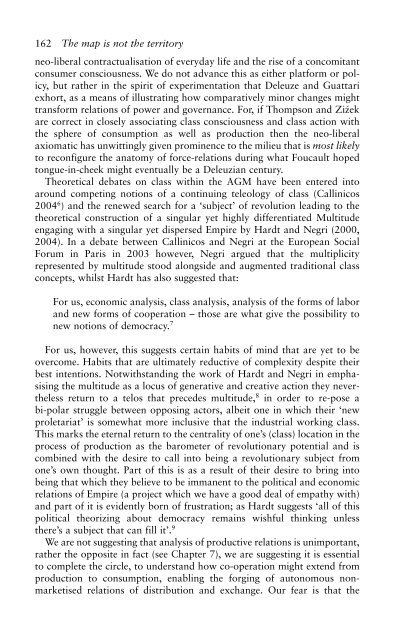Complexity and Social Movements: Multitudes at the Edge of Chaos ...
Complexity and Social Movements: Multitudes at the Edge of Chaos ...
Complexity and Social Movements: Multitudes at the Edge of Chaos ...
Create successful ePaper yourself
Turn your PDF publications into a flip-book with our unique Google optimized e-Paper software.
162 The map is not <strong>the</strong> territory<br />
neo-liberal contractualis<strong>at</strong>ion <strong>of</strong> everyday life <strong>and</strong> <strong>the</strong> rise <strong>of</strong> a concomitant<br />
consumer consciousness. We do not advance this as ei<strong>the</strong>r pl<strong>at</strong>form or policy,<br />
but r<strong>at</strong>her in <strong>the</strong> spirit <strong>of</strong> experiment<strong>at</strong>ion th<strong>at</strong> Deleuze <strong>and</strong> Gu<strong>at</strong>tari<br />
exhort, as a means <strong>of</strong> illustr<strong>at</strong>ing how compar<strong>at</strong>ively minor changes might<br />
transform rel<strong>at</strong>ions <strong>of</strong> power <strong>and</strong> governance. For, if Thompson <strong>and</strong> Zioek<br />
are correct in closely associ<strong>at</strong>ing class consciousness <strong>and</strong> class action with<br />
<strong>the</strong> sphere <strong>of</strong> consumption as well as production <strong>the</strong>n <strong>the</strong> neo-liberal<br />
axiom<strong>at</strong>ic has unwittingly given prominence to <strong>the</strong> milieu th<strong>at</strong> is most likely<br />
to reconfigure <strong>the</strong> an<strong>at</strong>omy <strong>of</strong> force-rel<strong>at</strong>ions during wh<strong>at</strong> Foucault hoped<br />
tongue-in-cheek might eventually be a Deleuzian century.<br />
Theoretical deb<strong>at</strong>es on class within <strong>the</strong> AGM have been entered into<br />
around competing notions <strong>of</strong> a continuing teleology <strong>of</strong> class (Callinicos<br />
2004 6 ) <strong>and</strong> <strong>the</strong> renewed search for a ‘subject’ <strong>of</strong> revolution leading to <strong>the</strong><br />
<strong>the</strong>oretical construction <strong>of</strong> a singular yet highly differenti<strong>at</strong>ed Multitude<br />
engaging with a singular yet dispersed Empire by Hardt <strong>and</strong> Negri (2000,<br />
2004). In a deb<strong>at</strong>e between Callinicos <strong>and</strong> Negri <strong>at</strong> <strong>the</strong> European <strong>Social</strong><br />
Forum in Paris in 2003 however, Negri argued th<strong>at</strong> <strong>the</strong> multiplicity<br />
represented by multitude stood alongside <strong>and</strong> augmented traditional class<br />
concepts, whilst Hardt has also suggested th<strong>at</strong>:<br />
For us, economic analysis, class analysis, analysis <strong>of</strong> <strong>the</strong> forms <strong>of</strong> labor<br />
<strong>and</strong> new forms <strong>of</strong> cooper<strong>at</strong>ion – those are wh<strong>at</strong> give <strong>the</strong> possibility to<br />
new notions <strong>of</strong> democracy. 7<br />
For us, however, this suggests certain habits <strong>of</strong> mind th<strong>at</strong> are yet to be<br />
overcome. Habits th<strong>at</strong> are ultim<strong>at</strong>ely reductive <strong>of</strong> complexity despite <strong>the</strong>ir<br />
best intentions. Notwithst<strong>and</strong>ing <strong>the</strong> work <strong>of</strong> Hardt <strong>and</strong> Negri in emphasising<br />
<strong>the</strong> multitude as a locus <strong>of</strong> gener<strong>at</strong>ive <strong>and</strong> cre<strong>at</strong>ive action <strong>the</strong>y never<strong>the</strong>less<br />
return to a telos th<strong>at</strong> precedes multitude, 8 in order to re-pose a<br />
bi-polar struggle between opposing actors, albeit one in which <strong>the</strong>ir ‘new<br />
proletari<strong>at</strong>’ is somewh<strong>at</strong> more inclusive th<strong>at</strong> <strong>the</strong> industrial working class.<br />
This marks <strong>the</strong> eternal return to <strong>the</strong> centrality <strong>of</strong> one’s (class) loc<strong>at</strong>ion in <strong>the</strong><br />
process <strong>of</strong> production as <strong>the</strong> barometer <strong>of</strong> revolutionary potential <strong>and</strong> is<br />
combined with <strong>the</strong> desire to call into being a revolutionary subject from<br />
one’s own thought. Part <strong>of</strong> this is as a result <strong>of</strong> <strong>the</strong>ir desire to bring into<br />
being th<strong>at</strong> which <strong>the</strong>y believe to be immanent to <strong>the</strong> political <strong>and</strong> economic<br />
rel<strong>at</strong>ions <strong>of</strong> Empire (a project which we have a good deal <strong>of</strong> emp<strong>at</strong>hy with)<br />
<strong>and</strong> part <strong>of</strong> it is evidently born <strong>of</strong> frustr<strong>at</strong>ion; as Hardt suggests ‘all <strong>of</strong> this<br />
political <strong>the</strong>orizing about democracy remains wishful thinking unless<br />
<strong>the</strong>re’s a subject th<strong>at</strong> can fill it’. 9<br />
We are not suggesting th<strong>at</strong> analysis <strong>of</strong> productive rel<strong>at</strong>ions is unimportant,<br />
r<strong>at</strong>her <strong>the</strong> opposite in fact (see Chapter 7), we are suggesting it is essential<br />
to complete <strong>the</strong> circle, to underst<strong>and</strong> how co-oper<strong>at</strong>ion might extend from<br />
production to consumption, enabling <strong>the</strong> forging <strong>of</strong> autonomous nonmarketised<br />
rel<strong>at</strong>ions <strong>of</strong> distribution <strong>and</strong> exchange. Our fear is th<strong>at</strong> <strong>the</strong>




